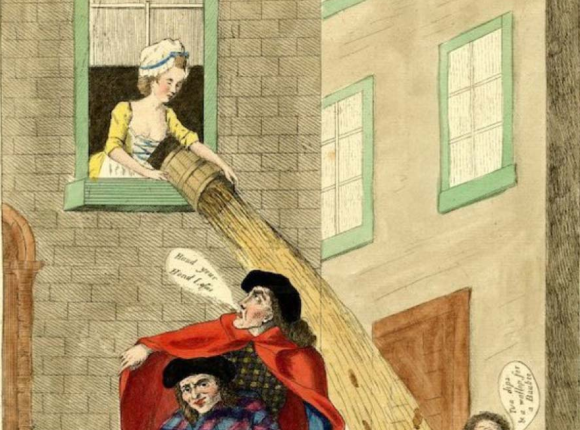
This is a slang term for toilet, and it was supposedly derived from the practice of the French yelling out the warning, “Gardez l’eau!” (pronounced gardy loo – meaning “mind the water”), before emptying the chamber pot from an upper level onto the street below. Following the devastation of the Bubonic Plague, some areas of Europe attempted to improve sanitation by outlawing the practice of discarding waste on public streets. When privacy slowly emerged as an issue, sanitation improved.
During the Middle Ages, flush toilets and indoor plumbing did not exist. There were several ways in which people ‘did their business’. A popular way was using the garderobe, which means ‘to guard the robes’. This was a private room, a bed-chamber area that was also referred to as a privy. It got this name because people kept their clothes in them, and they believed that the foul odor in these chambers repelled moths, which would otherwise eat the fabric. It is from ‘garderobe’ that the modern word ‘wardrobe’ is derived. Basically, these were seats (either made of stone or wood) attached to a shaft leading to a pit. These toilets were installed in castles and manor houses, so they were available only to the rich and powerful.
Less privileged people had to settle for more communal facilities, such as cesspits, which was simply a hole in the ground similar to an outhouse. Excrement would stay stagnant in the hole, so these cesspits needed to be emptied every once in a while, as excrement sank to the bottom and liquids flowed out between the spaces in the brick lining. In 1183, Frederick I Barbarossa (1122–1190) Holy Roman Emperor and Duke of Swabia held a Diet (legislative assembly) in the Great Hall of Germany’s Erfurt Castle, when suddenly the floor of the main hall collapsed, and the Emperor his knights and many of the dinner guests fell thirty-nine feet into the cesspool below and drowned. Emperor Frederick pulled through as he was able to grab on to the iron grates of a window, whereat he hung by the hands till he was rescued, but it was a while before any of his guests accepted another dinner invitation at the castle.
Written for Word of the Day Challenge Prompt – Gardyloo.
Thank god for indoor plumbing and flush loos!!
LikeLiked by 1 person
The odd thing is that man had these inventions before the Middle Ages, but the knowledge was lost after the Roman empire fell.
LikeLiked by 1 person
Thanks goodness we have modern plumbing now. I remember even as late as 1960/70 my husband’s grandma didn’t have indoor plumbing, just an outhouse, and had a chamber pot for use inside. Ick! 🙂
LikeLiked by 1 person
What an awful death that must have been with the floor collapsing and then drowning in a cesspool below. I can’t imagine anything worse than that. Yes we are lucky to to have indoor plumbing.
LikeLiked by 2 people
In the UK, loo is not so much slang as an informal and quite common phrase. “Popping to the loo” being, I suspect, more prevalent than ‘going to the toilet/bathroom/restroom/crapper’ etc among all classes and ages.
‘Gardez l’eau’ would be more correctly pronounced ‘Gar-day low’. Perhaps the ‘loo’ sound is a common corruption? Confusingly, ‘loo’ may also derive from the French word ‘lieu’ (pronounced ‘loo’) meaning ‘ease’…a place of ease! Which is amusing whether it be true or not!
At the site of the Roman Housesteads fort on Hadrian’s Wall many of the original stone work and foundations are still intact. There is evidence of under floor heating, stables, ironmongers, dining halls and also a communal loo with plank benches and cesspit for several dozen. There are many suggestions for the origin of the idiom ‘getting hold of the wrong end of the stick’ but the one suggested at Housesteads is that the soldiers used a stick with a cloth on one end instead of toilet paper and so…one wouldn’t want to get the wrong end of the stick.
Great post, Jim!
LikeLiked by 2 people
Thanks Nick and I enjoyed your explanations.
LikeLiked by 1 person
Oh my my! This is a horror story. Thank God we have indoor plumbing.
LikeLiked by 1 person
I can’t even begin to imagine what it would be like to fall thirty-nine feet into the cesspool and having no way to get out.
LikeLiked by 1 person
No, it would be a horrendous experience
LikeLiked by 1 person
I can’t remember living anywhere that had an outside loo….thankfully!
LikeLiked by 1 person
I think I remember seeing one at a campground.
LikeLike